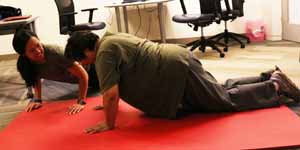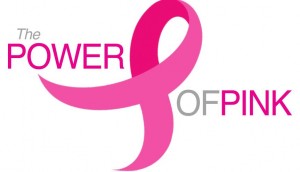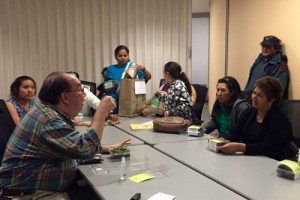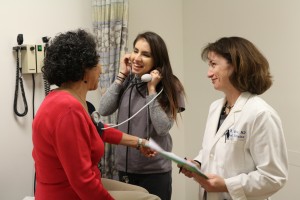The World Health Organization (WHO) describes health as “a state of complete physical, mental, and social well-being and not merely the absence of disease.” With the global healthcare conversation shifting to “wellness,” we at Arlington Free Clinic have embraced the opportunity to promote patients’ overall health in the spirit of the WHO definition. We are proud of several new initiatives aimed at improving our patients’ quality of life and helping them manage or prevent the progression of their diseases.
 We are particularly excited for the launch of Move to Health, our brand new physical activity program created in partnership with Body Dynamics, Inc. that aims to make physical activity a routine part of our patients’ lives. Especially for those challenged by or at risk for chronic disease, building endurance, strength and flexibility can provide tremendous health benefits. Patients participating in Move to Health meet one-on-one with a physical activity counselor to develop an individualized exercise prescription – and have regular phone contact in between visits to keep them on track.
We are particularly excited for the launch of Move to Health, our brand new physical activity program created in partnership with Body Dynamics, Inc. that aims to make physical activity a routine part of our patients’ lives. Especially for those challenged by or at risk for chronic disease, building endurance, strength and flexibility can provide tremendous health benefits. Patients participating in Move to Health meet one-on-one with a physical activity counselor to develop an individualized exercise prescription – and have regular phone contact in between visits to keep them on track.
Sedentary lifestyles and poor nutrition have long been linked with negative health outcomes, including higher risk of heart disease, stroke, type II diabetes, depression, and some cancers. These outcomes are especially marked in less educated adults and those below the poverty line, who are less likely to meet recommended physical activity guidelines. Over 80% of AFC patients do not get enough exercise and over 70% suffer from obesity and/or other chronic health conditions. Through Move to Health, we are targeting at-risk patients who are severely deconditioned, pre-diabetic, diabetic, hypertensive, or obese and equipping them with the tools to take ownership of their health.
 We’ve faced some challenges unique to our patient population in our effort to integrate wellness initiatives into our programs at AFC. One hurdle to success is the relatively low level of health literacy among many of our patients. When we were working with one patient to integrate jumping jacks – “like she had done in school” – into her exercise routine, she remarked how she never went to school. Additionally, many of our patients work long hours at multiple jobs, leaving little to no time for sufficient sleep or exercise. By working with our patients to understand their realities, we are continuously reevaluating how we present and convey information to our patients to help them find ways to improve their health.
We’ve faced some challenges unique to our patient population in our effort to integrate wellness initiatives into our programs at AFC. One hurdle to success is the relatively low level of health literacy among many of our patients. When we were working with one patient to integrate jumping jacks – “like she had done in school” – into her exercise routine, she remarked how she never went to school. Additionally, many of our patients work long hours at multiple jobs, leaving little to no time for sufficient sleep or exercise. By working with our patients to understand their realities, we are continuously reevaluating how we present and convey information to our patients to help them find ways to improve their health.
By designing highly personalized wellness programs like Move to Health, and by taking advantage of the opportunity to educate patients while they are already at AFC for other appointments, we are confident that we are helping our patients develop long-term, healthy habits. We are looking forward to continuing to promote the complete mental, physical and social well-being of our patients in ways that are meaningful to them.
Read more articles from our spring newsletter:

 Fifteen guests attended our “We Grow a Garden, We Grow in Health” presentation led by Stephen Hugh, AFC patient representative on the Board of Directors, and Arlington Food Assistance Center (AFAC) volunteer gardener, on May 11th in partnership with the AFAC and its Plot Against Hunger program. AFC patients and AFAC clients learned about gardening, how to make a small container garden for growing microgreens, the nutritional value of their planting, and discussed various recipe ideas for using their microgreens in healthy and affordable family meals. Participants discussed topics such as what “organic” means, and contributed their own gardening stories. One patient, for example, told about her family’s experience cultivating a “milpa” (corn field). Others spoke about attempts at growing cilantro in a window box and tips about growing yucca.
Fifteen guests attended our “We Grow a Garden, We Grow in Health” presentation led by Stephen Hugh, AFC patient representative on the Board of Directors, and Arlington Food Assistance Center (AFAC) volunteer gardener, on May 11th in partnership with the AFAC and its Plot Against Hunger program. AFC patients and AFAC clients learned about gardening, how to make a small container garden for growing microgreens, the nutritional value of their planting, and discussed various recipe ideas for using their microgreens in healthy and affordable family meals. Participants discussed topics such as what “organic” means, and contributed their own gardening stories. One patient, for example, told about her family’s experience cultivating a “milpa” (corn field). Others spoke about attempts at growing cilantro in a window box and tips about growing yucca. We are particularly excited for the launch of Move to Health, our brand new physical activity program created in partnership with Body Dynamics, Inc. that aims to make physical activity a routine part of our patients’ lives. Especially for those challenged by or at risk for chronic disease, building endurance, strength and flexibility can provide tremendous health benefits. Patients participating in Move to Health meet one-on-one with a physical activity counselor to develop an individualized exercise prescription – and have regular phone contact in between visits to keep them on track.
We are particularly excited for the launch of Move to Health, our brand new physical activity program created in partnership with Body Dynamics, Inc. that aims to make physical activity a routine part of our patients’ lives. Especially for those challenged by or at risk for chronic disease, building endurance, strength and flexibility can provide tremendous health benefits. Patients participating in Move to Health meet one-on-one with a physical activity counselor to develop an individualized exercise prescription – and have regular phone contact in between visits to keep them on track. We’ve faced some challenges unique to our patient population in our effort to integrate wellness initiatives into our programs at AFC. One hurdle to success is the relatively low level of health literacy among many of our patients. When we were working with one patient to integrate jumping jacks – “like she had done in school” – into her exercise routine, she remarked how she never went to school. Additionally, many of our patients work long hours at multiple jobs, leaving little to no time for sufficient sleep or exercise. By working with our patients to understand their realities, we are continuously reevaluating how we present and convey information to our patients to help them find ways to improve their health.
We’ve faced some challenges unique to our patient population in our effort to integrate wellness initiatives into our programs at AFC. One hurdle to success is the relatively low level of health literacy among many of our patients. When we were working with one patient to integrate jumping jacks – “like she had done in school” – into her exercise routine, she remarked how she never went to school. Additionally, many of our patients work long hours at multiple jobs, leaving little to no time for sufficient sleep or exercise. By working with our patients to understand their realities, we are continuously reevaluating how we present and convey information to our patients to help them find ways to improve their health. Despite the changes in health care since the passage of the Affordable Care Act, AFC continues to see numerous new faces each month at our lotteries and is receiving more referrals from Virginia Hospital Center and local shelters than ever before. The demand for our services continues to greatly exceed our capacity, and we anticipate the need to remain high for the foreseeable future. Consistently innovating and striving for excellence, AFC continues to look for ways to better serve our patients; to efficiently collaborate with partners to provide the best care at the lowest cost to our community; and to reach out to the medically underserved.
Despite the changes in health care since the passage of the Affordable Care Act, AFC continues to see numerous new faces each month at our lotteries and is receiving more referrals from Virginia Hospital Center and local shelters than ever before. The demand for our services continues to greatly exceed our capacity, and we anticipate the need to remain high for the foreseeable future. Consistently innovating and striving for excellence, AFC continues to look for ways to better serve our patients; to efficiently collaborate with partners to provide the best care at the lowest cost to our community; and to reach out to the medically underserved.